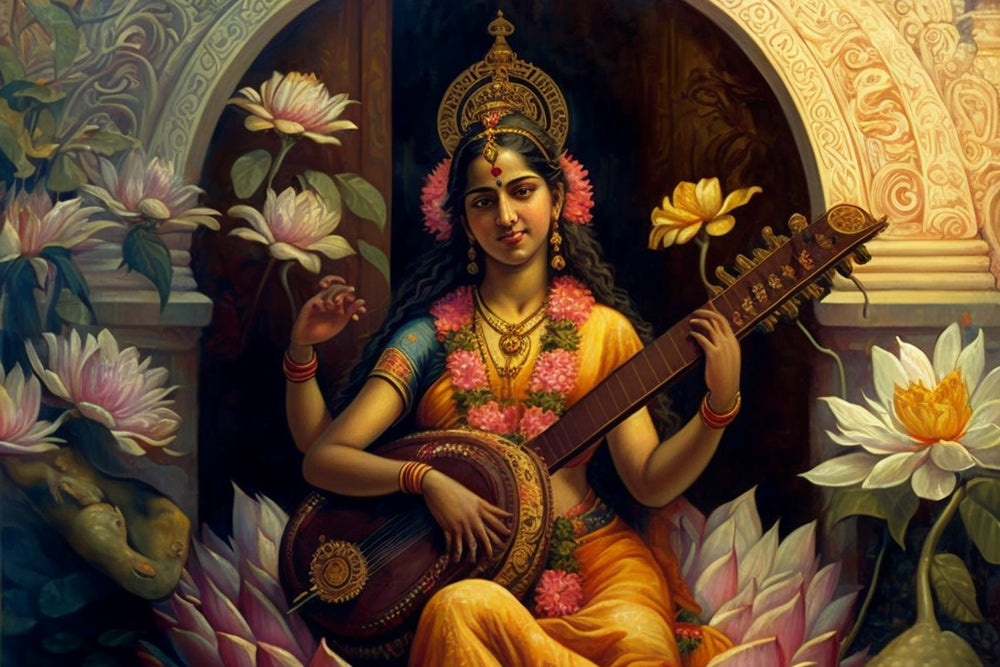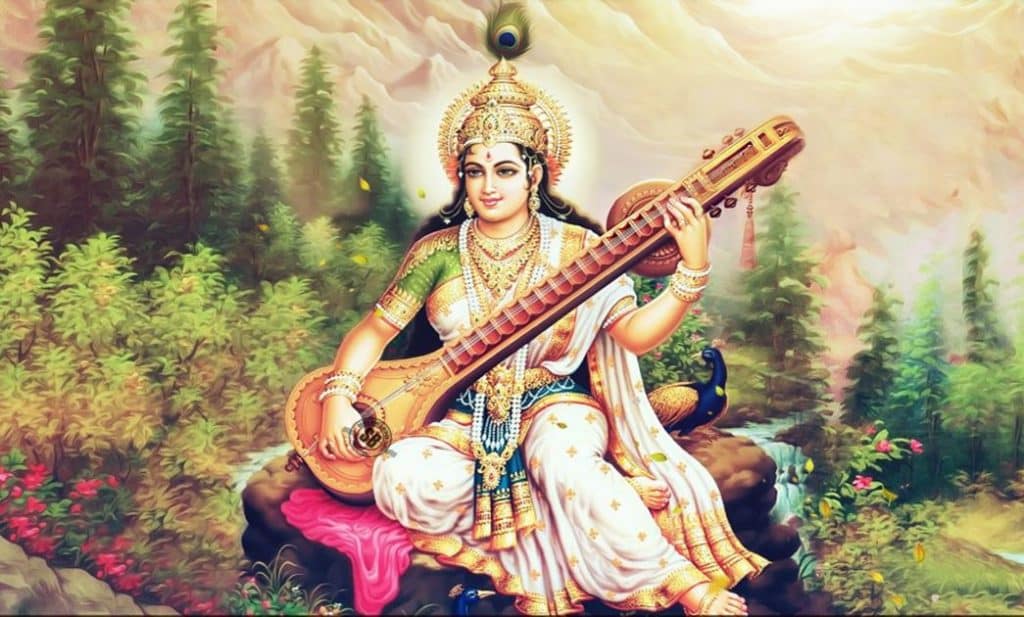About Lord Saraswati

"Enlightenment Through Art: Embracing the Power of Saraswati"
Lord Saraswati, also known as Goddess Saraswati, is a prominent deity in Hinduism. She is revered as the goddess of knowledge, arts, music, learning, and wisdom. Saraswati is often depicted as a graceful and serene goddess adorned in white attire, symbolizing purity and transcendence.
Her iconography typically includes four arms, each holding symbolic items. On the one hand, she holds a book, representing knowledge and learning. In another hand, she holds a vina (stringed musical instrument), symbolizing the arts and creativity. Her third-hand holds a mala (prayer beads), symbolizing spirituality and concentration. The fourth hand carries a lotus flower, symbolizing beauty and purity.
Saraswati is portrayed as seated on a white lotus, which signifies spiritual enlightenment and liberation. The lotus also symbolizes the blossoming of knowledge and wisdom from the fertile realms of the mind.
Devotees of Saraswati seek her blessings for academic excellence, artistic talents, creative pursuits, and intellectual growth. She is particularly revered during academic ceremonies, music recitals, and other cultural events where learning and the arts are celebrated.
Saraswati is also regarded as the consort of Lord Brahma, the creator of the universe. Together, they represent the union of creativity and knowledge necessary for the sustenance of life and the functioning of the cosmos.
Worship of Saraswati involves offering prayers, chanting mantras dedicated to her, and seeking her guidance and blessings in the pursuit of knowledge and creative endeavors. She is regarded as a source of inspiration, enlightenment, and the divine spark that ignites the thirst for learning and self-improvement.
What is Saraswati Devi real name

In Hindu mythology and tradition, Saraswati Devi is widely known and referred to by the name "Saraswati." Saraswati is considered her primary and commonly used name. It is worth noting that in Hinduism, deities are often referred to by their primary or commonly known names, and these names carry deep symbolic and cultural significance.
The power of Lord Saraswati
The power of Saraswati, the Hindu goddess of knowledge, arts, music, and wisdom, is revered and celebrated in various ways. Here are some aspects that highlight the power and significance of Saraswati:
Wisdom and Knowledge: Saraswati embodies the essence of wisdom and knowledge. She is believed to possess the divine knowledge that enlightens and empowers individuals. Devotees seek her blessings to attain intellectual brilliance, clarity of thought, and deep insights.
Creative Inspiration: Saraswati is considered the muse of artists, writers, musicians, and all creative individuals. Her divine energy fuels imagination, innovation, and artistic expression. She is believed to awaken dormant talents, inspire originality, and infuse creativity into various forms of artistic endeavors.
Learning and Education: Saraswati is revered as the patron goddess of education. Students, teachers, and scholars seek her blessings for academic success, mastery of subjects, and the acquisition of knowledge. Her power is invoked during exams, study sessions, and educational pursuits to enhance concentration, memory, and understanding.
Speech and Communication: Saraswati is associated with the power of eloquence and effective communication. She is believed to bestow the gift of articulate speech, graceful expression, and effective communication skills. Devotees seek her blessings to enhance their ability to express ideas, convey thoughts clearly, and engage in meaningful dialogue.
Spiritual Growth: Saraswati's power extends beyond worldly knowledge and creativity. She is also revered as a source of spiritual growth and enlightenment. By seeking her guidance and grace, individuals aspire to transcend mundane limitations, attain spiritual insight, and deepen their connection with the divine.
Harmonious Existence: Saraswati's power is not limited to intellectual pursuits but also encompasses the quest for a balanced and harmonious life. Through her blessings, devotees strive to attain inner peace, emotional well-being, and harmonious integration of mind, body, and spirit.
Transformation and Liberation: Saraswati's power is often associated with transformation and liberation from ignorance. By seeking her divine guidance, individuals aim to transcend limitations, expand their consciousness, and embark on a path of self-realization.
Overall, the power of Saraswati encompasses intellectual brilliance, creative inspiration, spiritual growth, effective communication, and the pursuit of harmonious existence. Devotees seek her blessings to harness these powers and enrich their lives with wisdom, knowledge, and creative expression.
Who is Lord Saraswati?

Lord Saraswati, also known as Goddess Saraswati, is a revered deity in Hinduism. She is considered the goddess of knowledge, arts, music, learning, and wisdom. Saraswati is depicted as a divine feminine figure associated with intellectual pursuits, creative expression, and spiritual growth.
As the embodiment of wisdom, Saraswati is regarded as the supreme source of knowledge and the patroness of education. She represents the power of intellect, clarity of thought, and the pursuit of truth. Students, scholars, and seekers of knowledge invoke her blessings to excel academically, acquire skills, and expand their intellectual capacities.
Saraswati is often depicted with four arms symbolizing various aspects of her power. On the one hand, she holds a book, representing knowledge and learning. In another hand, she holds a vina, a stringed musical instrument that signifies the arts and creativity. Her third-hand holds a mala (prayer beads), symbolizing spirituality and focus. The fourth hand carries a lotus flower, representing beauty, purity, and enlightenment.
Devotees of Saraswati seek her guidance and grace to nurture their creative abilities, whether in music, writing, painting, or any form of artistic expression. She is regarded as the divine source of inspiration, offering blessings for originality, imagination, and the exploration of one's creative potential.
Saraswati is also considered a spiritual force, guiding individuals on the path of self-realization and inner growth. Through her blessings, seekers aspire to transcendence, spiritual insight, and the integration of knowledge and wisdom into their lives.
In Hindu mythology, Saraswati is often associated with learning and the consort of Lord Brahma, the creator of the universe. Together, they represent the harmonious interplay of creation, knowledge, and creativity necessary for the sustenance and evolution of existence.
Worship of Saraswati involves offering prayers, chanting mantras dedicated to her, and seeking her blessings to attain wisdom, knowledge, creativity, and spiritual growth. She is revered as the embodiment of the divine feminine energy that nurtures the intellect, inspires creativity, and illuminates the path of enlightenment.
Who is the husband of Saraswati
In Hindu mythology, Lord Brahma is considered the husband of Saraswati. Lord Brahma is revered as the creator of the universe in the Hindu pantheon. Saraswati is often depicted as the consort of Brahma, symbolizing the union of creativity and knowledge.
According to traditional belief, Brahma created Saraswati from his own essence to assist him in the task of creation. As the goddess of knowledge and arts, Saraswati supports Brahma in the process of bringing forth the universe and its inhabitants.
The association of Saraswati with Brahma highlights the inseparable relationship between intellectual pursuits, creative expression, and the act of creation. Together, Brahma and Saraswati embody the cosmic forces responsible for the manifestation and sustenance of life, as well as the cultivation and dissemination of knowledge and wisdom.
The benefits for putting Saraswati idol at home
Placing a Saraswati idol at home is believed to bring several benefits and positive energies. Here are some of the perceived advantages:
Knowledge and Wisdom: Having a Saraswati idol at home is thought to enhance intellectual abilities and promote the pursuit of knowledge. It is believed to create an environment conducive to learning, studying, and academic success for students of all ages. The presence of Saraswati is thought to inspire clarity of thought, stimulate the mind, and improve concentration.
Creative Expression: Saraswati is associated with the arts, music, and creative endeavors. Having her idol at home is believed to encourage artistic expression, boost creativity, and inspire individuals engaged in various artistic pursuits. It is thought to create an ambiance that nurtures imagination, originality, and innovation.
Blessings for Students: Saraswati is considered the patron goddess of education. Placing her idol at home is believed to invoke her blessings for students, helping them excel in their studies, retain knowledge, and perform well in exams. It is thought to provide motivation, focus, and guidance in academic pursuits.
Speech and Communication: Saraswati is associated with eloquence and effective communication. Having her idol at home is believed to improve speech and language skills, enhance articulation, and facilitate clear expression. It is thought to bring blessings for effective communication, whether in personal interactions, public speaking, or professional endeavors.
Spiritual Growth: Saraswati is not only associated with worldly knowledge but also spiritual enlightenment. Having her idol at home is believed to create an environment conducive to spiritual growth and self-realization. It can inspire individuals to seek higher truths, deepen their spiritual practices, and cultivate inner wisdom.
Positive Energy and Harmony: The presence of Saraswati's idol is believed to attract positive energy and create a harmonious atmosphere in the home. It can help purify the environment, dispel negative influences, and promote a sense of peace, tranquility, and positivity.
It is important to note that the benefits associated with a Saraswati idol are rooted in spiritual and cultural beliefs. While many people find solace, inspiration, and positive effects in having Saraswati's presence at home, the impact may vary for individuals. The idol serves as a reminder and symbol of the qualities and energies associated with Saraswati, and devotees seek her blessings and grace through devotion and reverence.
Where should we keep Saraswati idol?

The placement of a Saraswati idol in a home should be done with respect and consideration. Here are some general guidelines for where to keep a Saraswati idol:
Study Area: It is common to place the Saraswati idol in the study area or a dedicated space for learning. This could be a study room, library, or quiet corner where educational activities take place. The idol can be positioned facing east, which is associated with the direction of the rising sun and symbolizes enlightenment.
Altar or Pooja Room: If you have a designated altar or pooja room in your home, you can place the Saraswati idol there. This allows for focused worship and reverence. The idol can be placed alongside other deities, or it can have its own dedicated space if desired.
Elevated Platform or Shelf: It is preferable to keep the Saraswati idol on an elevated platform or a clean shelf. This signifies respect and highlights the importance of the deity. Make sure the idol is secure and stable in its placement.
Clean and Serene Space: Ensure that the area where the idol is placed is clean, tidy, and well-maintained. A serene and peaceful environment enhances the positive energy and aura surrounding the idol. Avoid placing the idol in areas prone to clutter or disturbance.
Respectful Placement: The idol should be placed at an appropriate height, ideally at eye level or slightly higher, allowing for easy viewing and offering of prayers. It is recommended to avoid placing the idol on the floor or in a disrespectful manner.
Personal Preference: Ultimately, the placement of the Saraswati idol can vary based on personal preference, cultural practices, and available space in your home. The most important aspect is to create an atmosphere of reverence and devotion when positioning the idol.
Remember to periodically clean and maintain the idol and the space around it. Additionally, offer prayers and perform rituals according to your personal beliefs and practices to honor and seek the blessings of Saraswati.
It is advisable to consult with a knowledgeable priest or religious authority for specific customs and rituals associated with the placement of Saraswati idols based on your cultural or regional traditions.
Which day is more special for Lord Saraswati
In Hinduism, the festival of Basant Panchami is considered particularly special for the worship and celebration of Goddess Saraswati. Basant Panchami, also known as Vasant Panchami, falls on the fifth day of the Hindu month of Magha, which typically occurs between late January and early February.
Basant Panchami marks the arrival of spring and is dedicated to Goddess Saraswati, the deity of knowledge, arts, and learning. On this day, devotees honor Saraswati through prayers, rituals, and special ceremonies.
During Basant Panchami, people dress in yellow attire, which is symbolic of the blossoming of mustard flowers, signifying the onset of spring. Yellow is considered an auspicious color associated with knowledge and purity.
Devotees offer prayers and seek Saraswati's blessings for academic success, artistic endeavors, and the pursuit of wisdom. Many educational institutions, schools, and cultural organizations organize Saraswati puja (worship) on this day. Students place their books, instruments, or tools near the Saraswati idol or image, seeking her blessings for progress in their studies and creative pursuits.
Basant Panchami is also considered an opportune time for initiating young children into the world of learning. It is common for parents to introduce their children to reading and writing on this day, considering it an auspicious beginning to their educational journey.
Additionally, devotees engage in singing, dancing, and playing musical instruments as a form of reverence to Saraswati, emphasizing her association with music and the arts.
While Basant Panchami is especially significant for Saraswati worship, it is important to note that Saraswati is revered and worshipped throughout the year in various contexts, educational institutions, and cultural events.
conclusion:
In conclusion, Lord Saraswati holds a significant place in Hindu mythology and devotion. She is revered as the goddess of knowledge, arts, music, learning, and wisdom. Saraswati embodies the qualities of intellectual brilliance, creative inspiration, and spiritual growth. Her presence is believed to bring blessings and positive energies into the lives of her devotees.
As the patroness of education, Saraswati is invoked for academic success, clarity of thought, and the acquisition of knowledge. Students seek her guidance and blessings to excel in their studies, while scholars and seekers of wisdom turn to her for deep insights and intellectual advancement.
Saraswati's association with the arts highlights her role as the muse of creativity. She inspires artistic expression, nurtures talent, and encourages individuals to explore their creative potential. Through music, writing, painting, and other forms of artistic endeavors, devotees seek to connect with Saraswati's divine energy.
Furthermore, Saraswati is revered as a source of spiritual growth and enlightenment. Her grace is sought by those on a path of self-realization, inner wisdom, and the integration of knowledge with spirituality. Saraswati represents the harmonious interplay of intellect, creativity, and spiritual consciousness.
Devotion to Saraswati is expressed through prayers, rituals, and the placement of her idol in homes, study areas, or dedicated altars. By honoring and seeking her blessings, devotees strive to cultivate wisdom, enhance their intellectual capacities, and lead a life filled with creativity, knowledge, and spiritual enlightenment.
While Saraswati is particularly celebrated during festivals such as Basant Panchami, her influence extends beyond specific occasions. She continues to inspire and guide individuals in their pursuit of knowledge, artistic expression, and spiritual awakening, serving as a symbol of the divine feminine energy that nurtures intellect, creativity, and the quest for higher truths.


